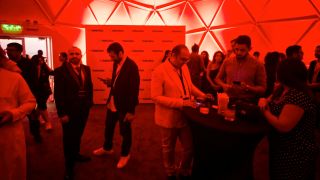Opinion: The YouTube Music Middle East Launch was very, very confusing.
I see red people

It’s 6:15PM on a suitably uncomfortable Monday evening. Septembers are always the most fun times to go out in Dubai, because the weather always leaves you wondering; it’s neither uncomfortably hot, nor cold, but it’s not the kind of hot about which you’re used to complaining. My only moment of silence was at the lobby of Caesar’s Palace—the sun was setting, and I got to have a quiet moment before the chaos that would ensue after being led into what looked like some sort of dome a few blocks away.
I was at the Middle East launch of YouTube Music and YouTube Premium—the former is Google’s way of being extra, because Google Play Music isn’t enough, and the latter is for those who can’t stand to watch Lele Pons plagiarizing Friends with 1,564,321 mid-rolls, and would love to cringe without the ads.
Maybe I’m being too harsh with YouTube Premium. Launched initially by the brand name YouTube Red (yikes)—and dubbed music Key (huh?) prior to that, the platform was geared to become YouTube’s version of the next best streaming service, with award-winning originals like—like uh… Escape the Night, Scare PewDiePie, and uh… The Thinning, starring Logan Paul.
Seriously?
Seeing red
But then somewhere along the line something happened, and the content began to suitably improve. Acquisitions included shows executive produced by Doug Liman (Impulse), boasting intertextuality (Cobra Kai, a sequel series to The Karate Kid), and original fiction like Lifeline, apart from critically-acclaimed documentaries like Kedi, et al.
As I entered the venue, I didn’t exactly know what to expect, but I knew one thing for sure—I’d be seeing red for hours. Not metaphorically—okay maybe a part of me would, but the venue lights were completely, utterly, unnecessarily red, almost like I was a part of an arthouse 80s horror pastiche with deliberately scary lighting. Finally spotting the desk with the media invites, I walked up to it and gave them my details.
“I’m sorry we can’t find you.”
Get daily insight, inspiration and deals in your inbox
Get the hottest deals available in your inbox plus news, reviews, opinion, analysis and more from the TechRadar team.
I asked them to check again.
“Wait, you’re from media?,” they asked, like I never previously mentioned who I worked for. “Yeah, your desk is right there—,” they pointed at a rather hidden portion where the media desk stood, almost lost from the crowd. The desk I was at wasn’t for the media, I later realized. It was for the artists, and not being as creatively talented as I’d like to be, I quietly trotted off to the media desk.
A few minutes after collecting my pass and lounging around for a while, the doors opened and I was now in — another dome. It looked awfully similar, except for the stage, which was also our point of entry. We literally had to walk onto the stage, and then step down from it to get to our seats, so my stint at being the center of attention was short-lived.
Lost in translation
The event eventually started, and our eyes were finally graced with some neutral lighting. The host walked in, followed by YouTube Middle East’s Tarek Abdalla rushing through the launch of their Music and Premium subscription services like there were better things to do—and this gave me some hope; Okay, this isn’t just about YouTube services then, it’s going to be about a lot more perhaps? But that too was cut short with “We now welcome four emerging artists to a panel that will be exclusively in Arabic. Grab your translators.”
Eventually, after artists waxing lyrical with some phrases in the English language that I could understand—Egypt-based singer Abu took the time to include a generic motivational quote in between a discussion on what could possibly only have been about the future of YouTube Music and what it meant for emerging artists in the Middle East: “Do. Believe in yourself.” Um… okay, I guess. This will do. It’s not like there’s a massive algorithm at work that doesn’t care about your talent and works only to serve the capitalist interests of Google. Sure, I’m down. Struggling YouTubers like Will Smith definitely deserve a chance at the spotlight.
The panel was followed by each of the attending artists being awarded with an artistic rendering of their own faces. Which is completely not a show of narcisissm; how can it possibly be narcissistic? It’s definitely relevant to the launch of these services, right? After all of that, we were finally given the press conference we needed to get more information on the services we actually came to know more about. A lot of questions were asked about YouTube Music—I personally just wanted to know if their originals would now be globally available, which they confirmed it would—but really nobody asked much about YouTube Premium. It’s almost like they wanted to make that service an afterthought of sorts.
As the press conference came to an end, the guests were advised to wait for a few more minutes for a variety of performances. It was cutting too close to the Apple Special Event keynote by that time, which was a fantastic excuse for me to bolt and run far away from the shiny, glaring red lights of YouTube.
Most Popular


